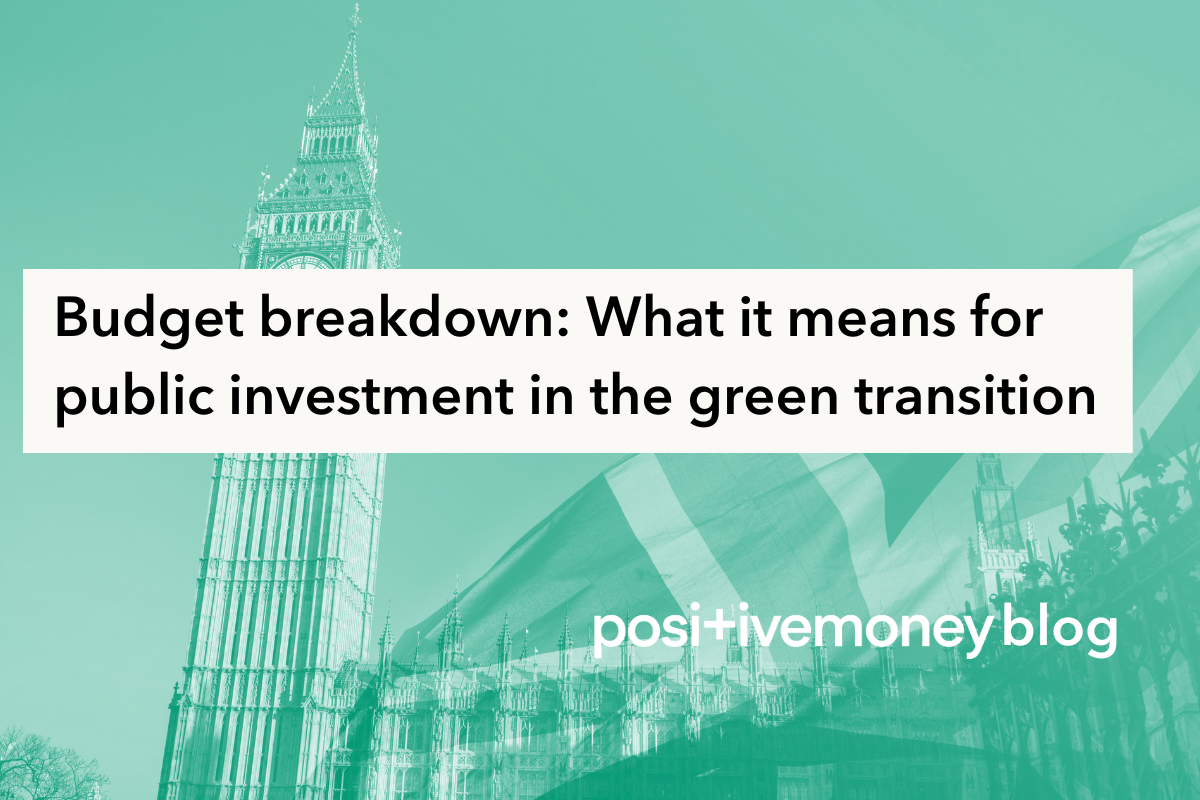
UK
12 February 2026
Changes to the UK’s fiscal rules made in yesterday's budget have freed up more room for public investment in the green transition, but risk exacerbating our financialised approach to infrastructure investment.
Changes to how we measure debt have freed up more room for public investment
With spending on investment in the NHS, transport and more increased significantly in the budget, the IPPR calculates that this budget will increase overall public investment by £66 billion over this parliament, when compared to the previous government’s plans. This sum is not insignificant, and will have been welcomed by the broad spectrum of voices calling out for greater public investment.
Much of this spending was enabled by changes to the UK’s fiscal rules - self imposed spending rules that governments choose to abide by, in effort to demonstrate Government spending is ‘responsible’. It’s worth noting that fiscal rules are not a science, but a political choice. That being said, they have important implications for how much, and on what, the Governments spend.
As a quick explainer on the changes:
The new Government has two fiscal rules. The first is for public debt to be falling as a proportion of GDP within the fifth year of the Office for Budget Responsibility's five-year forecast; and the second, for all day-to-day spending (typically the running costs of public services) to be equivalent to tax receipts.
The first rule is the same as that under the previous Government, but crucially, the measure of the public debt has been changed. Under the previous rule, ‘Public Sector Net Debt excluding the Bank of England’ (PSND ex-BoE) was the measure used. This counts all debt issued by the public sector, minus the value of some ‘liquid’ assets such as cash and the loans made by the Bank of England through its Term Funding Scheme. The new Government has moved to a measure of ‘Public Sector Net Financial Debt’ (PSNFD) (also known as ‘Public Sector Net Financial Liabilities', or PSNFL, for added confusion).
The key point of this change is that under PSNFD, a broader range of financial assets held by the Government are netted off the overall figure. This includes things like student loans, which the government expects some repayment for in the future, and public sector pension fund liabilities, which own corresponding financial assets. The overall impact of this is twofold: in the near-term, it has gave the government around £50 billion more ‘headroom’ in this budget for borrowing than under the previous measure, whilst remaining within its chosen rule of having debt falling in economic forecasts; and in the long-term, it makes borrowing spending for things that are equally classified as 'financial' investments, essentially neutral in terms of impact on the debt target.
Even if other decisions in the budget, such as the choice to freeze fuel duty whilst raising the price of bus transport might be a worrying indicator of Reeves’ pledge to be the ‘first green Chancellor’ falling by the wayside, the changes are a positive step toward reducing what has been a major barrier to funding the climate transition.
What does this mean for the National Wealth Fund?
A key question surrounds how changing the fiscal rules will impact investment via policy banks such as the new National Wealth Fund (NWF). We’ve proposed that the NWF could be a cornerstone institution in financing a green transition, and ensuring that the transition is just. To scale up the NWF's currently limited financing capacity, Positive Money and others including LSE researchers have proposed that it should be given powers to do it’s own borrowing, alike major public banks in other countries. Though the Chancellor did not announce such powers would be given in the budget, under the new rules, government borrowing for investments made through the NWF as loans or minority equity stakes would be essentially neutral, meaning that the rule change could still theoretically allow for significantly greater capitalisation of the fund. However, it's worth noting that this could still be constrained by political pressure to reduce central government borrowing, even within the fiscal rules.
A just transition mandate and democratic governance will be key to prevent the fund driving further financialisation of our infrastructure
Whilst this change could free up room for much greater investment via the NWF, also at stake is the nature and form of the investments made. To not impact the debt measure, investments will need to be considered as ‘financial’ - borrowing for direct government investment in physical infrastructure (say hospitals) will still add to the debt measure.
This limits the scope for the NWF to take controlling stakes in companies, and runs the risk of incentivising ‘PFI-style’ deals whereby public financing is primarily used to derisk investments for private investors and banks, exacerbating the financialisation of our public realm as has been warned by Barclays’ analysts. The recently announced first deal made by the NWF, with the fund guaranteeing loans for social housing decarbonisation by protecting the revenues of Barclays’ and Lloyds, provides an indicator of the types of deals that could be favoured under the new model.
Whilst the capacity for greater public control would be preferable, guardrails should be put in place to inhibit the fund making essential infrastructure into revenue generators for private finance:
a mandate to prioritise decarbonisation and just transition goals above ‘crowding in’ private investment;
a truly democratic governing structure;
robust strict conditionalities for companies and investors that benefit from these public funds, driving them to align their own activities with a green and just transition.
What does the budget mean for a green Bank of England?
Greening private finance was notably absent from the budget, despite speculation that the Budget would see a much-awaited update to the remit of the Bank of England. The Chancellor is required by law to update the remits of the Bank’s policy making committees at least every 12 months, which conventionally is done alongside the autumn budget. Instead, it was announced that this year, they would be updated on the 14th November alongside the Chancellor's Mansion House Speech, which the Chancellor sets out priorities for the financial sector. This also happens to fall on COP29 finance day.
Last November, Jeremy Hunt de-emphasised climate change in one of his remit letters to the Bank. This was shortly followed by the Bank announcing it had reduced its resourcing of climate work, a move confirmed in the Bank's 2024 climate-related financial disclosure. Last months’ news that the Bank had fallen down to 7th place in our most recent ranking of G20 central banks’ green policies gave further evidence of the Bank's laggard status.
Alongside a pledge to make the UK the ‘green finance capital of the world’, Labour's manifesto made a welcome commitment to reverse these changes. After Labour ran on a manifesto and campaign that equated green energy with energy security and lower bills, we and others will be watching closely to ensure that the Chancellor reflects the fundamental threats that ecological breakdown poses to our economy in next months remit letters to the Bank, and beyond.
